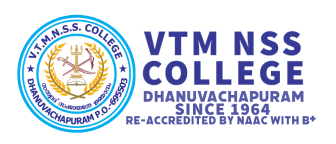Institutional Distinctiveness

Institutional Distinctiveness
Being a rural institution, VTM NSS College, Dhanuvachapuram caters to a socially and economically weaker sections of the learner fraternity – a significant number of the them being first-generation learners. The institution devices various teaching-learning methodologies and encourages them to think beyond the curricular box. As the holistic development of the learner is the motto of our institution, various programmes of social, cultural, linguistic, historical, and academic relevance are conducted. These programmes contribute to the efficacious growth of the learner into socially responsible and confident individuals, ready to face the world confidently, yet with compassion for their fellow men.The mission of the college is to provide the students with an excellent background in the fundamentals of their subjects to facilitate a comprehensive development of their all-round competency, to foster scientific temper and a culture of lifelong learning, and to render socially relevant extension services.
VTM NSS college takes annual socio-economic survey (basic personal details and academic data) to identify the first-generation learners. The major social and economic variables used for the study are gender, religion, caste, economic status, education, and occupation details of the parents. Department wise date is collected using google forms and consolidate the results using appropriate statistical methods. Following statistics shows the data collected and analysed. The Socio-economic survey conducted by IQAC is assessed and the detailed report is submitted by the Internal Quality Assurance Cell to the head of the institution and the College Council for further action. Various suggestions and concerns raised by the stake holders are taken into consideration by the college council and actions are suggested. The action taken measures during the academic years 2018-23 are as follows:
- The head of the departments were given special instructions to give the First semester students of both CBCSS programme and Postgraduate programme and how the same is going to shape their academic prowess and career in future.
- Instructions were given to conduct Bridge courses for at least two-weeks and to conduct more learner-oriented sessions through activities and group discussions.
- The mentors were asked to give special attention to each learner and assess their progress.
- Classes were taken in blended mode to ensure maximum student participation, especially add-on classes and skill development classes were taken in the online mode. All assignments and project submissions were also encouraged to be executed in the online mode.
- Mentors were given instruction to ensure N-List membership of students to ensure uninterrupted digital learning and to tackle concerns over the lack of availability of study materials.
- Students were encouraged to participate in student seminars and competitions on power point presentation and paper presentations were encouraged
- Industrial visits to reputed institutions based on their subject of study as part of their curriculum were conducted
- Field visits were conducted as part of the curriculum delivery where, the learners got acquainted with indigenous knowledge systems and the current social scenario in which they are living
- Student centric teaching-learning methodologies like satellite group study systems, peer teaching, etc were augmented and departments were given instructions to conduct them diligently.
- As per the opinions from the students, the teachers were instructed to take regular feedback on the course completed and to improvise accordingly.
- Library was also equipped with new books related to research and subject/syllabus base content and were made accessible to the learners.
- Initiated steps to improve the cleanliness and aesthetics of campus buildings and facilities – More seating spaces were created in the outdoor spaces for students to utilise for curricular and extra- curricular activities.
- Upgraded Classroom equipment and ICT enabled classrooms.
- More skill enhancement programmes as part of Naipunya – One Student One Skill were conducted.
- Boot camps and special training were given to students in Sports and learners were encouraged to participate in cultural and other extra-curricular activities.
- Career Guidance and Placement Cell conducted various workshops, seminars, awareness sessions regarding the current job sector and to enable the learners industry ready.
- Learners were also encouraged to participate in NSS and NCC to imbibe human values, responsibility towards environment and its conservation, inculcate leadership qualities, social commitment, commitment to oneself and to nation.
- Regular PTS meetings were held to monitor the students’ progress and to have an interpersonal interaction with the parents.
- Interface with subject experts and industry experts were conducted to enhance the competence of the learner and to enable them scale the heights of academic and professional success – Distinguished Alumni Lecture (DAL), Pedestal Lecture Series, research conference, etc were also conducted.
First-generation learners are a resilient and valuable part of the higher education landscape. Their journeys are marked by unique challenges, but also by remarkable triumphs and strengths. As our college continue to strive for inclusivity and diversity, it is crucial to recognize the significance of first-generation learners and provide them with the
support they need to succeed. VTM NSS College is committed to ensure that these trailblazers continue to inspire future generations and contribute to a more equitable and enriched educational environment.
